Navigating Recent Windstorm & Power Outages
/As we navigate these adverse weather effects, please remember there are resources and rights through our union and through our communities that can help.
Read MoreAs we navigate these adverse weather effects, please remember there are resources and rights through our union and through our communities that can help.
Read MoreAs you may know, there is scheduled to be a strike at Sacred Heart next week. This Unfair Labor Practice strike is over the Providence Sacred Heart Technical Unit Collective Bargaining Agreement and Providence committing several unfair labor practices that include making changes in the workplace without first negotiating and skirting the bargaining process by attempting to direct deal and coerce staff. This strike does NOT include the Service and Maintenance agreement. There has been some confusion due to emails Providence Sacred Heart management has sent that did not specify which departments are going on strike. All Technical staff will be out on a ULP strike beginning at 2pm on Monday, April 22, and continuing until 8:30pm on Tuesday, April 30.
Service and Maintenance employees are required to work their regularly scheduled shifts during the time that the technical staff are on strike per Article 13 of your contract. Service and Maintenance staff should not join the strike line while on lunches or breaks. If you would like to support the strike lines on your own personal non-work time, your fellow UFCW 3000 members in the Technical unit would really appreciate the show of solidarity!
You should wear UFCW 3000 buttons and solidarity stickers, and blue or yellow scrubs. Get creative and please wear them each day! One of the most important things you can do is to share stories about what is happening in the hospital. Please keep your Union Rep informed on what is happening and if there are any stories that could make strikers feel empowered. Our job during the strike is to show solidarity- both visually and with our actions. If management instructs you to remove your buttons and/or stickers, you should comply with their request but report the incident to your Union Rep.
One of the most powerful things you can do to affirm your scope of work is question and object to improper assignments that are changes to your normal working conditions. You also have a responsibility to provide good patient care and make sure no person is harmed. If management asks us to do something that you are uncomfortable with, is unsafe, or outside of our normal responsibilities- you have the right to object and state why.
Objections can include any personal reason that you feel strongly about- including your licensure, patient safety, insufficient training, or that it’s not in your job description. You have the right to push back and encourage managers and replacement workers to do the additional tasks asked of you. However, you only refuse a task if it is an abnormally dangerous assignment.
You have the right to object- but if you refuse it may be considered insubordination. Your job is to object on why an assignment is improper, and if management insists on you doing the work, you should comply, document the scenario, and call our Union Rep if you have questions. If you feel unequipped or unsafe for any reason, report it to your Union Rep as well.
Scheduling, Overtime, Low Census, and all other provisions of our contracts remain in effect and should be adhered to. Please refer to your Union contract: ufcw3000.org/contracts
No, after the schedule is posted, changes to the schedule can only be made with mutual consent. Out of support for your fellow UFCW 3000 members we ask that you consider not picking up any extra shifts.
7.8 Schedule Posting. Work schedules of shifts and days off (including call schedules) for a six (6) week period will be posted three (3) weeks in advance. After posting, the schedule may only be changed by mutual consent.
Management may ask for volunteers to take unpaid time off or to use educational time– deciding to do so is up to you. They must continue to follow the Low Census process that is in your contract.
Invite your family and friends to join the Techs on the strike line! Also, If you are not working at the time, you are invited to join Technical staff and community allies at an evening solidarity rally on Wednesday, April 24, at 7pm over in Cowley Park (next to the hospital at 7th & Division St.)
If you have any questions or concerns on the Service and Maintenance contract, please contact Union Representative Lenaya Wilhelm, 360-409-0556.

OLYMPIA, WA – This morning, Governor Inslee signed into law Senate Bill 6007, a bill intended to protect grocery store workers and communities from the negative impacts of corporate megamergers in the grocery industry. Drafted in response to the news that grocery giants Kroger (owner of Fred Meyer and QFC) and Albertsons/Safeway are threatening to merge into one huge company, ESSB 6007 saw enormous support from local Washington grocery store workers and community allies, who advocated throughout the legislative session for its passage.
“As I explained to legislators, we’ve already learned the hard way through past grocery chain mergers about the upheaval it causes for workers and shoppers when these chains merge and close or sell off neighborhood grocery stores,” said Yasmin Ashur, a UFCW 3000 member and checker at the Port Orchard Albertsons who testified in support of the bill and was on hand to see the governor sign it today. “We saw it in Port Orchard with the Albertsons/Safeway merger not that long ago. I am so proud to say I stood up with my fellow workers and helped pass legislation that will help protect our jobs.”
This new legislation puts in place basic guidelines for large grocery stores when they change hands, like in an acquisition or merger, to ensure that essential food workers’ lives and our communities’ access to food and household necessities are not thrown into chaos. It requires public notice of new ownership, a period of job protection or re-hire for eligible current employees, protection of current working conditions and collective bargaining agreements, and mandatory engagement with local government if a merger would cause the closure of a store in an existing food desert.
“The difference between unemployment caused by a pandemic and job loss caused by corporate buyouts is that the potential harm of a merger is foreseeable,” said Britt Leggett, a UFCW 3000 member and deli clerk at the Fred Meyer in the Ballard neighborhood of Seattle who also testified in support of the bill and attended the bill signing today. “That’s what this legislation seeks to remediate: to help workers keep their jobs and seniority when their stores changes owners. The law also ensures that constituents will be served by grocery workers who they know well, who have the skills to do their jobs, and follow the health rules to keep food safe.”
Hundreds of grocery store workers with UFCW 3000 across the state sent messages to lawmakers encouraging the passage of SB 6007, and some traveled to Olympia to meet lawmakers in person.
“It’s a big sacrifice for everyday working people to take time out of their busy lives to try and engage with the local political process,” said Joe Mizrahi, Secretary Treasurer of UFCW 3000. “But being in a union means we can share the load, work together, and make real change that impacts entire industries.”
UFCW 3000 is working with Providence to address the Meal Waiver situation. We consider the language in the meal waiver to be a direct negotiation with employees since Providence is asking you to waive rights outlined in our contracts. We want to ensure that you receive appropriate compensation for missed or late meal periods and that your contract is not negatively impacted.
For shifts of 11 hours or more: If your shift length is 11 hours or more, you are entitled to two 30-minute meal periods. If you are currently only receiving one 30-minute meal period and have not waived your second meal period, you may be entitled to compensation. Additionally, the employer may extend your shift based on the language in the CBA and past practices in order to accommodate your second meal period.
It is your right to waive the second meal period, but you may miss out on overtime pay for missing your second meal period if you choose to waive it. While we recommend not waiving your second meal period, the decision to do so is ultimately yours.
In the meantime, if you have any questions, please reach out to your union rep:
Anthony Cantu (Providence Everett RNs): 206-436-6566
Jack Crow (Providence Everett Pros and Techs): 206-436-6614
Madison Derksema (Providence St. Peter, Providence Radiant Care, and Providence Centralia): 206-436-6603
Lenaya Wilhelm (Providence Holy Family and Sacred Heart): 509-340-7369
Juanita Quezada (Providence Sacred Heart Techs and Providence St. Mary): 509-340-7407
Amy Radcliff (Providence Mt. Carmel and St. Joseph): 509-340-7370
| Shift Length | Rest Breaks | Meal Period |
|---|---|---|
| 4-5 hour shift | 10 min* x1 | 0 |
| 8-hour shift | 10 min* x2 | 30 min x1 |
| 10-hour shift | 10 min* x2 | 30 min x1 |
| 12-hour shift | 10 min* x3 | 30 min x2 |
| 16-hour shift | 10 min* x4 | 30 min x2 |
You must receive a paid rest break for every four (4) hours worked.
You cannot waive your right to a rest break.
A meal period cannot be substituted for breaks: Any employee who works more than four (4) hours gets their breaks as outlined above, and any scheduled meal period.
You are entitled to a 30-minute uninterrupted meal period when working more than five hours. The first meal period must be between the second and fifth hour worked. If you work 11 hours or more during the day, you must receive a second meal period no later than five (5) hours after the end of your first meal period.
Interrupted Mealtime: If you are required to stay on duty during a meal break you are still entitled to 30 total minutes of mealtime, excluding interruptions, plus 30 minutes of pay. Time spent performing the work task is not considered part of the meal period. The entire meal period must be paid no matter the number of interruptions. For example, if you received a 30-minute meal break but had to answer your work phone throughout then you should be paid 30 minutes for your meal period and receive a total of 30 minutes (non-consecutive) mealtime.
Late Mealtime: If you are not given time to have a 30-minute mealtime, you must be paid for your time worked plus 30 minutes. Paying employees 30 minutes for the meal period does not absolve the employer’s responsibility to give you a late 30-minute unpaid mealtime when practicable.
The above is a general guideline to meal periods and rest breaks. For more in-depth information please contact your union representative OR download the Health Care Guide to Meal and Rest Breaks >>
Once again UFCW 3000 members and communities are facing some extreme fall and winter weather, including recent flooding. It is important to remember that if you, your family, or your coworkers have been affected by extreme weather, you have rights at work, resources through your union, and the support of your community.
Just cause protections at work: With a union contract, you have “just cause” protection, meaning you should not be disciplined at work for reasonably having to deal with a circumstance outside of your control like a flood that affects your home, work, or commute to work
Be clear in communicating with your employer if you are unable to report to work on time or at all due to flooding or other extreme weather
Make sure to invoke your right to union representation if you are called into a meeting that could lead to discipline (we call these “Weingarten Rights,” read more here)
The right to a safe workplace: If you feel unsafe at work, report any safety concerns to your worksite safety committee & management right away, and get support from your Shop Steward and/or Union Rep if your concerns are not addressed
Union resources: If your home or work is affected by flooding or extreme weather and financial assistance would help, speak with your Union Rep about the UFCW 3000 Membership Assistance Fund
Mutual aid: As union members, we know standing together and supporting each other is how we really make a difference. If you have ideas for ways to connect with or support fellow UFCW 3000 members in need, talk to a Shop Steward and/or your Union Rep for help with organizing
Extreme weather is dangerous in our workplaces and our communities, which is why UFCW 3000 members, including our Climate Justice Advisory Board, work for climate policies that will help protect us and our future health.
A strike isn't just a halt in our work; it's a collective stand for our rights and the well-being of our patients. According to federal law, we have the right to strike, but we must give the hospital a 10-day notice to ensure patient care isn't compromised.
The prospect of a strike isn't just a last resort; it's a powerful tool that can drive change. It forces Providence to reconsider its stance and acknowledge our proposals. The mere threat of a strike can be as influential as the strike itself, but for it to be effective, we must show that we are united and ready to take action.
The initial step involves voting for strike authorization, allowing our nurse bargaining team to initiate a strike. Throughout negotiations, our team assesses the strike's potential impact. There might be instances where a strike is averted as our team deems a ratifiable contract agreement achievable. Strikes fall into two categories: economic and unfair labor practice (ULP). Economic strikes center around concerns like wage increases proposed by the Employer. In contrast, ULP strikes address issues such as the Employer's involvement in unfair labor practices, such as bargaining in bad faith.
The strike's main goal is to pressure the Employer to accept our proposals. In an economic strike, we stay on strike until a tentative contract agreement is achieved. Then, we resume work and vote on the agreement. During a ULP strike, we strike for a designated period. In both situations we will ask to engage in ongoing contract negotiations with the aim of securing a tentative agreement, and subsequently resume work and then hold a vote on the agreement.
Having an updated email, cell phone, and address is vital to making sure you receive updates and vote notices. Your address on file is where the Union will mail Strike benefit checks.
WILL I RECEIVE PAY WHILE ON STRIKE?
The Executive Board of UFCW 3000 will vote on strike benefits for nurses who take part in strike duty. Strike benefits will not fully replace our wages but will help. They have approved strike benefits of $500 for nurses, members and non-members, who picket a minimum 20 hours a week. Our Union also has a hardship fund to assist members whose families face particularly difficult financial situations. Additionally, food assistance and other financial assistance may be available through community organizations and other unions. Notify your creditors prior to falling behind. Communicate your situation and explore options for reduced payments or refinancing. Prioritize your expenses, placing essentials like mortgage/ rent, utilities, insurance, car payments, gas, child support, and alimony at the top.
WHAT IF THE EMPLOYER LOCKS US OUT?
If the employer chooses to lockout nurses they have to lockout all nurses including non-union members. Workers locked out by their employers are generally eligible for unemployment benefits. The Employment Security Department will determine eligibility for unemployment benefits on a case by case basis.
WILL I STILL HAVE HEALTHCARE BENEFITS DURING THE STRIKE?
There is a lag month under your insurance plan that would keep your insurance through the end of the month.
HOW LONG WOULD A STRIKE LAST?
The duration of a strike is a strategic decision made by the bargaining team. The 10-day notice given to the Employer would likely be for a 3 or 5 day ULP Strike. The key to a successful strike is a united work force and support from our allies and the patients in the community.
I AM A REPRESENTED BY UFCW 3000, DO I HAVE TO STRIKE? HOW MANY WORKERS WILL IT TAKE FOR A STRIKE TO BE EFFECTIVE?
A large active picket line is vital to a successful strike. Every nurse needs to participate—members of UFCW 3000 or not—to prevent the facility from operating as usual. The more nurses we have out on the line, the harder it is for people to cross it. Being at the picket is also the best way to get the latest information on how the strike is going and to show the community that healthcare workers are united in the strike.
WHAT IF I CHOOSE NOT TO STRIKE? WHAT ARE THE CONSEQUENCES OF CROSSING THE PICKET LINE?
There are no sanctions imposed on nurses who cross the picket line or choose not to strike. Crossing a picket line will undermine our attempts as nurses to provide a better framework for the future growth of our profession and achieve our negotiating goals. It also erodes the camaraderie in the workplace, prolongs the strike, and negatively impacts our efforts to work as a team once the strike is settled.
WILL I BE REQUIRED TO NOTIFY MY MANIGER IF I DECIDE TO STRIKE?
No, you will not be required to individually notify your manager. Our Union will be providing strike notice to the Hospital if our bargaining committee decides to invoke a strike. If you feel compelled to give them an answer tell them, “Yes I will be striking and standing with my bargaining team’s decision to strike.”
As a member of UFCW 3000 you have the right to enforce your Collective Bargaining Agreement (CBA). Your CBA is a legally binding agreement between your Union and the Employer.
Read MoreWashington: Aberdeen. Bellevue, Bellingham, Centralia, Chelan, Clarkston, Colville, Des Moines, Ellensburg, Everett, Forks, Grand Coulee, Richland, Lynnwood, Moses Lake, Mount Vernon, Newport, Oak Harbor, Olympia, Okanogan, Port Angeles, Port Townsend, Seattle, Silverdale, Spokane, Tacoma, Toppenish, Walla Walla, Wenatchee, Yakima. Oregon: Baker City, Hermiston, Island City, Pendleton. Idaho: Coeur d’Alene.
APPROVED DUES STRUCTURE CHANGES
Effective October 1, 2023 Dues (Except as otherwise noted or as soon as administratively possible.)
1. Initiation fees, New Member meeting credits, Direct Bill Administrative fee, and any other items not addressed below shall remain unchanged.
2. Minimum Dues rates for all industries and job classifications shall be the Constitutional minimum.
3. Transfer fee (This is an administrative fee for an incoming member with a withdrawal from another non UFCW union in lieu of an initiation fee.) shall be $60.
4. ALL JOB CLASSIFICATIONS ON PERCENT OF SALARY DUES RATES
Dues shall remain at 1.55% of monthly gross income, except that no member shall have a dues rate above $80. Effective January 1, 2024, dues shall remain at 1.55% of monthly gross income, except that no member shall have a dues rate above $85. Effective October 1, 2024, Dues shall remain at 1.55% of monthly gross income, except that no member shall have a dues rate above $90.
There are a small number of employers that are unable to process a percent of salary dues rate. For these employers, dues are calculated based on the 1.55% of monthly gross income and charged as a fixed dues rate. These dues will mimic the dues rate schedule listed above.
5. ALL JOB CLASSIFICATIONS ON FIXED DUES RATES
The over 70 dues rates in our current structure shall be simplified to 6 fixed dues rates. This shall provide administrative ease, clarity, and fairness so that members in the same classifications have the same dues rates.
This consolidation of dues rates shall result in some members receiving a dues decrease, some shall remain the same, and some will have a modest increase.
FOR FORMER 1439 GROCERY MEMBERS AND PCC MEMBERS: The effective date of the updated dues structure shall be upon contract ratification or at the latest October 1, 2024.
Below is the updated dues rate table of job classifications with a fixed dues rate. Any job classification not listed on the dues rate table shall be moved to the closest dues code to their current classification and/or current dues rate.
| Codes | EMPLOYERS/JOB CLASSIFICATION/APPENDIX | New Rate |
|---|---|---|
| 1 | BASE- Helper Clerk/ Courtesy Clerk/ Garment/ Laundry/Retail/ Drug Store | Constitutional Minimum* |
| 2 | Grocery Appendix B/C/Barista/ClickList/Fulfillment/Floral/Service Center Clerk/HBC/Video/Photo/ Grocery Office (NON All-Purpose Clerk) / Food Processing / Seafood Service Counter/Cannabis/Meat and Seafood Processing/ Oversea Casing | $37.50 |
| 3 | Grocery Appendix A/ Meat Wrapper/ CCK/ Meat Warehouse/ Seafood Manager/ All-Purpose Clerk/ Grocery Pharmacy Tech A/ | $53.50 |
| 4 | Meat Cutter/ Meat Manager/ Meat Utility/ Independent Owner Operators | $60.50 |
| 5 | Fred Meyer General Merchandise/ QFC Broadway Market Home | $35.00 |
| 6 | Reduced Dues Rate: Seasonal/Part Time/ High School/ Special Needs | $24.00 |
| * The current Constitutional Minimum is at $32.08 |
Email dues@ufcw3000.org with any questions on the dues structure or questions on where you specifically fall within the structure.

I am protected by the National Labor Relations Act to engage in concerted activity with my coworkers, including wearing union insignias or paraphernalia.
Under Section 7 of the NLRA, I have “the right to self-organization, to form, join, or assist labor organizations, to bargain collectively through representatives of their own choosing, and to engage in other concerted activities for the purpose of collective bargaining”
Under Section 8(a)(1) of the NLRA, it is an unfair labor practice for an employer “to interfere with, restrain, or coerce employees in the exercise of the rights guaranteed in Section 7” of the NLRA.
During the COVID-19 crisis workers have been encountering situations that may be considered unsafe work assignments. In the normal day-to-day operations at work, workers are generally required to comply with management orders and directives. Complying with management directives is considered part of your job duties and not doing so can lead to discipline. Employees covered under a Union contract should usually "obey now, and grieve later." But situations might be different when you are being asked to do something unsafe.
The following Q & A addresses a specific exception to the general rule that employees must obey orders and grieve them later.
If you are being asked to do something unsafe at work, you should call your Union Rep (call 1-800-732-1188 to be connected) or the Member Resource Center (1-866-210-3000). Due to the high volume of calls we are receiving you may be directed to voicemail, but someone will reach out to you as soon as they can. You can also email safety concerns to safetyreport@ufcw3000.org
*If you are not a member of UFCW 3000 and need support, contact us!
A: Because you are covered by a Union contract the answer is yes. Your Union contract includes a just cause provision. In this situation, just cause means you should not be disciplined for refusing to obey an unreasonable order. An order to perform a work assignment that is likely to cause serious bodily harm to an employee is not reasonable. To be covered by this exception, your fear of bodily harm must be objectively reasonable and not speculative.
A: Yes, there are state and federal laws that provide additional or separate protections. One example is OSHA (click here to read an OSHA summary).
A: It is always best to try to work with management to solve the problem. For example, you should explain to management why you feel the work assignment is unsafe or dangerous so that your employer has an opportunity to problem solve. You can also tell your supervisor you would be happy to accept the work assignment if it can be made safe to perform i.e., by providing you with adequate equipment or protective devices, adequate supplies, protective clothing, additional staffing, etc.
A: No, under most circumstances, you should stay on site and remain available to work safe assignments. If management sends you home, asks to meet with you to investigate the situation, or issues you any discipline, you should contact your union rep or the rep of the day immediately.

Kristina was Michaela’s first interview here on the podcast, but they didn’t get to the full story of Kristina’s union journey. What happens when you become a full-time union rep? And what if it doesn’t work out like you planned? Kristina talks about her time as a union rep, why it was not actually a great fit for her, and how it impacted her returning to work as an even more educated and empowered shop steward.
UFCW 3000 union shop steward Michaela is always ready to answer fellow members’ questions about their union. She’s also a devoted murder podcast listener. Put those interests together, and she decided to start a union podcast to get all her coworkers’ questions and her own questions answered, and to meet as many people as possible who could share what it means to be a part of UFCW 3000. (No murder on this podcast, only solidarity!)
*The information shared on this podcast is offered by rank and file union member leaders of UFCW 3000. There may be inaccuracies or misstatements shared, as members will be speaking from the lenses of their perspectives and life experiences. While members are doing their best to share good information, we can make no claims to 100% accuracy and this podcast should not be construed as legal advice.

How can your union further your career? What is a union apprenticeship? What's our union doing to create more high-paying and safer jobs in our industries? Michaela talks to fellow UFCW 3000 member Indy about his experience with the union meat cutting apprenticeship program, and then talks to Evan and Andy about the apprenticeship and the new WeTrain workforce development organization.
UFCW 3000 union shop steward Michaela is always ready to answer fellow members’ questions about their union. She’s also a devoted murder podcast listener. Put those interests together, and she decided to start a union podcast to get all her coworkers’ questions and her own questions answered, and to meet as many people as possible who could share what it means to be a part of UFCW 3000. (No murder on this podcast, only solidarity!)
*The information shared on this podcast is offered by rank and file union member leaders of UFCW 3000. There may be inaccuracies or misstatements shared, as members will be speaking from the lenses of their perspectives and life experiences. While members are doing their best to share good information, we can make no claims to 100% accuracy and this podcast should not be construed as legal advice.

What can you do to support fellow workers organizing their union? UFCW 3000 member and podcast host Michaela speaks with fellow UFCW 3000 member and health care worker Alison about supporting other workers when they want to organize a union, even if they’re in another state—and especially if they work for your same employer. Bonus intro chat with UFCW 3000 organizer Emma about what’s so fun about organizing.
UFCW 3000 union shop steward Michaela is always ready to answer fellow members’ questions about their union. She’s also a devoted murder podcast listener. Put those interests together, and she decided to start a union podcast to get all her coworkers’ questions and her own questions answered, and to meet as many people as possible who could share what it means to be a part of UFCW 3000. (No murder on this podcast, only solidarity!)
*The information shared on this podcast is offered by rank and file union member leaders of UFCW 3000. There may be inaccuracies or misstatements shared, as members will be speaking from the lenses of their perspectives and life experiences. While members are doing their best to share good information, we can make no claims to 100% accuracy and this podcast should not be construed as legal advice.

UFCW 3000 member and first-time podcast host Michaela introduces herself, her union, and why she decided to make a podcast about it. To answer the questions she hears most frequently from coworkers, she talks to friend and fellow member Kristina about how Kristina got involved in her union and what she’s learned about our rights on the job, union power, the benefits of being union, and more.
UFCW 3000 union shop steward Michaela is always ready to answer fellow members’ questions about their union. She’s also a devoted murder podcast listener. Put those interests together, and she decided to start a union podcast to get all her coworkers’ questions and her own questions answered, and to meet as many people as possible who could share what it means to be a part of UFCW 3000. (No murder on this podcast, only solidarity!)
*The information shared on this podcast is offered by rank and file union member leaders of UFCW 3000. There may be inaccuracies or misstatements shared, as members will be speaking from the lenses of their perspectives and life experiences. While members are doing their best to share good information, we can make no claims to 100% accuracy and this podcast should not be construed as legal advice.

Join us for this informative session and get answers to your questions about retirement and learn more about the 401(k)-retirement we bargained into our union contract.
UFCW 3000 offices 23040 Pacific Highway S. Des Moines WA, 98198
Talk to your Steward or Union Rep if you want to attend!
As our state faces wildfire season, wildfires and wildfire smoke may affect us in the workplace and at home. Below are important things to know to stay safe and enforce your rights at work. Here are the most important actions to care for yourself and your coworkers during wildfire season:
Report any safety concerns to your worksite safety committee & management right away, and get support from your Shop Steward and/or Union Rep if your concerns are not addressed
Get accommodations if needed and exercise your rights—use your sick leave if you become unwell; speak with a health care provider and use FMLA or exercise your disability rights under the ADA if you have a health condition that makes you vulnerable to wildfire smoke
If your home or work is affected by wildfire and financial assistance would help, speak with your Union Rep about the UFCW 3000 Membership Assistance Fund
L&I has adopted an emergency rule again this year, effective June 15 through September 29, 2022, to protect workers who may be exposed to wildfire smoke on the job.
This rule requires covered employers to:
Have a written wildfire smoke response plan.
Determine employee smoke exposure levels before work and periodically during each shift when smoke is present.
Train employees on wildfire smoke hazards.
Train supervisors on how to respond to health issues caused by wildfire smoke.
Inform employees of available protective measures against wildfire smoke.
Further requirements will depend on the level of smoke in the air, or the Air Quality Index (AQI)—read the summary or full emergency rules above for information, or talk with your Shop Steward or Union Rep.
Your employer may or may not be covered by the emergency rule depending on the potential for exposure to smoke in your workplace. But you should still report smoke-related safety concerns to your employer and alert your Shop Steward or Union Rep if your concerns are not addressed. The state L&I website reminds us:
“Employers are never allowed to retaliate against an employee for reporting an air quality hazard, an adverse health effect, or for seeking medical treatment due to a work-related illness or injury.”
You have the right to a safe workplace, and if wildfire smoke makes your workplace unhealthy for you, you should be able to address that with your employer and get support from your Shop Steward and/or Union Rep.
You can wear a respirator mask at work that helps protect you against wildfire smoke.
Most masks we wear to protect against COVID-19 do not actually protect against wildfire smoke. The right mask to protect against wildfire smoke is an N95 mask or other respirator with the same or higher level of protection. These respirator masks should have two straps and the word “NIOSH” and/or “N95” or “N100” printed on it. More information on respirators from L&I >>
When the air is smoky, your employer should allow workers to follow basic steps that will help prevent excessive exposure to wildfire smoke—that could include things like reassigning workers to less smoky areas or allowing for extra rest and water breaks away from smoky work areas.
If you or a family member gets sick because of wildfire smoke, you have the right to use Paid Sick & Safe Leave for illness
You may also be able to use your Paid Sick & Safe Leave if your child’s school or place of care, or your worksite has been shut down by a public official due to health-related reasons resulting from exposure to wildfire smoke
If you are vulnerable to smoky air due to an existing medical condition, talk to your health care provider about your workplace and see if they have recommendations for how to keep you safe from smoke exposure. Use FMLA if needed, or exercise your disability rights under the ADA.
If your workplace, home, or family are evacuated, burned, or otherwise affected by active wildfires:
With a union contract, you have “just cause” protection, meaning you should not be disciplined at work for reasonably having to deal with a circumstance outside of your control like a wildfire that affects your home, work, or commute to work
Make sure to invoke your right to union representation if you are called into a meeting that could lead to discipline (we call these “Weingarten Rights,” read more here)
More and more, we face hazardous weather events like extreme heat that can affect us at work and at home. In dangerously hot conditions you can take action to stay safe and healthy, like drinking plenty of fluids, staying out of the sun, checking on vulnerable people, and taking extra precautions when outside.
Under the Occupational Safety and Health Act (OSHA), employers have a duty to protect workers from recognized serious hazards in the workplace, including heat-related hazards. Especially if you work outside, be aware of your health and safety during any Excessive Heat Warning, and check in with your coworkers. If your workplace doesn’t feel safe, tell management and contact your Shop Steward or Union Rep as soon as you can. Find our FAQ on refusing unsafe work assignments here.
This kind of extreme weather is dangerous in our workplaces and our communities, which is why UFCW 3000 members work for climate policies that will help protect us and our future health.
Find your Union Rep (call 1-866-210-3000 to be connected)
File a safety report by emailing safetyreport@ufcw21.org with your name, work location, contact information, and a description of the safety issue
Not a union member? Get in touch if you want to organize your workplace.
OSHA has three basic recommendations for safety in extreme heat are: 💧 water, 🪑 rest, and ⛱️ shade.
Under OSHA law, employers are responsible for providing workplaces free of known safety hazards. This includes protecting workers from extreme heat. An employer with workers exposed to high temperatures should establish a complete heat illness prevention program.
Provide workers with water, rest, and shade.
Allow new or returning workers to gradually increase workloads and take more frequent breaks as they acclimatize, or build a tolerance for working in the heat.
Plan for emergencies and train workers on prevention.
Monitor workers for signs of illness.
If you perform work outdoors for more than 15 minutes in a 60-minute period, you may be considered an Outdoor Worker in Washington, and your employer may have responsibilities to you under Washington State’s emergency heat exposure rules effective through June 15, 2022. When temperatures are at or above 89 degrees, employers must provide outdoor workers with cool water and additional paid cool-down rest time, and when the temperature is at or above 100 degrees, employers must also provide other ways to cool down like a shaded area and ensure you have a paid cool-down rest period of at least 10 minutes every two hours.
Heat illness can be very serious. Learn the symptoms of heat illness and basic safety recommendations so you can stay safe at work and home.
Information from Washington State Dept. of Health:
Information from King County Public Health:
Spend more time in air-conditioned places if possible
Dress in lightweight clothing
Drink plenty of water and avoid drinks with caffeine, alcohol, and large amounts of sugar—sip frequently, don’t wait until you’re thirsty
Do not leave children or pets unattended in vehicles under any circumstances
Reduce activities that are tiring or take a lot of energy
When outside, limit the time you’re in direct sunlight
Do outdoor activities in the cooler morning and evening hours
During outdoor work, the Occupational Safety and Health Administration recommends scheduling frequent rest breaks in shaded or air conditioned environments
Anyone overcome by heat should be moved to a cool and shaded location. Heat stroke is an emergency! Call 9 11.
WHAT TO LOOK FOR:
High body temperature (103°F or higher)
Hot, red, dry, or damp skin
Fast, strong pulse
Headache
Dizziness
Nausea
Confusion
Losing consciousness (passing out)
WHAT TO DO
Call 911 right away—heat stroke is a medical emergency
Move the person to a cooler place
Help lower the person’s temperature with cool cloths or a cool bath
Do not give the person anything to drink
WHAT TO LOOK FOR:
Heavy sweating
Cold, pale, and clammy skin
Fast, weak pulse
Nausea or vomiting
Muscle cramps
Tiredness or weakness
Dizziness
Headache
Fainting (passing out)
WHAT TO DO:
Move to a cool place
Loosen your clothes
Put cool, wet cloths on your body or take a cool bath
Sip water
Get medical help right away if:
You are throwing up
Your symptoms get worse
Your symptoms last longer than 1 hour
WHAT TO DO:
Stop physical activity and move to a cool place
Drink water or a sports drink
Wait for cramps to go away before you do any more physical activity
Get medical help right away if:
Cramps last longer than 1 hour
You’re on a low-sodium diet
You have heart problems
WHAT TO LOOK FOR:
Heavy sweating during intense exercise
Muscle pain or spasms

Great news for your retirement benefits. We wanted to share some fabulous news: after more than a decade of work, as of July 1, 2021, we have secured our retirement plans and their future funding is more solid than it has been in a very long time.
What is a retirement pension? We all hope to retire after a lifetime of work with enough income to live with dignity and some degree of independence. While relatively few people these days have a monthly pension that is paid for life, it is something that we have been able to keep in place for our union grocery store workers. A solid retirement plan is made up of many sources: personal savings, Social Security and retirement/pensions and investments. Your retirement pension from your work at the grocery store is one of these sources.
This path to secure our retirement benefits under the Sound Retirement Trust (SRT) required many steps for the employers and the unions and over the last year we have continued to push forward along that path. Some of you may be near retirement after decades of work while others may have started at the grocery store in just the last few years. Whatever your situation, your pension is one of the most important ways to have income when you retire. Your employer begins making payments into your pension when you are hired, and you become vested in the pension plan typically after just 5 years of work in the stores.
While grocery store workers have successfully fought to keep our pensions under the SRT, for nearly twenty years it has had funding problems caused by two large economic crashes (in 2000 and 2008) and long-term changes in the industry. In 2019 our union bargaining team secured a tentative agreement to turn that around and members approved that plan at vote meetings. We have been working hard ever since to move through all the steps to implement this approved agreement. On July 1, 2021, we completed the final step to secure the pension funding.
As a result of our pension agreements and the changes described below, the SRT will become what is called “Green Zone” status and will stay in the green zone for the foreseeable future.
Under the 2019 bargaining, three changes were made to help secure your retirement benefits:
For Kroger Employees:
• All the benefit liabilities for all benefits earned for your work before July 1, 2021, under the SRT will be transferred to the UFCW Consolidated Fund. Kroger will contribute to the Consolidated Fund to pay for all of these liabilities within 7 years.
• When you retire, your pension benefits for your work before July 1, 2021, will be paid by the UFCW Consolidated Pension Fund.
For Other Employees:
• The current SRT will remain in place and continue to be funded for your work before July 1, 2021. The SRT will continue to get a regular contribution from your employer for every hour you work in the future.
• When you retire, your pension benefits for your work before July 1, 2021, will be paid by the SRT.
• For All Employees under 2019 Bargain:
• Future retirement benefits for your work on and after July 1, 2021 will be in one new fund called the Sound Variable Annuity Pension Plan (VAP).
• The Sound VAP will continue to get a regular contribution from your employer for every hour you work. The Sound VAP is sending you a notice about how the VAP works. Below are some basic rules about the VAP. When you retire, your will receive one check for your work before July 1, 2021 (from SRT or Consolidated Fund) and one check from the VAP.
Finally, all of your service credited and covered employment under the SRT and the VAP are counted under the other plan for all eligibility provisions. This ensures that you do not lose vesting or become ineligible for benefits under the SRT as a result of these changes. This includes eligibility for benefit options and the time periods for applying and determining qualification for a pension or disability benefit, participation and vesting purposes.
In the past, large or drastic declines in the stock market where the pension investments were made, resulted in reductions in the value of the SRT’s funding and reduction to the early retirement and other benefits. To help insulate grocery store workers’ future benefits from these drastic swings, the Variable Annuity Plan (VAP) is structured with a built-in safety mechanism so the benefits provided will track the VAP funding levels.
When the VAP’s investments in the stock market are doing well, and there are returns of over 8.5%, that extra money is required to go into the rainy-day fund reserve account, called a stabilization reserve. In a year where the returns from the pension plan’s investment drops below 2%, the benefits paid under the VAP are shored up with money from this stabilization reserve. The stabilization reserve also will be funded with an additional $15 million in 2022.
The “variable” part of the plan comes into effect with the returns are between 2% and 8.5%. For returns that are between 2 % to 5.5%, there can be adjustments downward in benefits. For years with returns greater than 5.5% up to 8.5%, there can be adjustment upwards. With these safeguards and adjustments, the VAP should stay fully funded in all market conditions and the benefits increase over time as wages increase. Long term, returns are expected to be at or over 5.5%.
In 2019 and prior contract negotiations, months of time and effort were spent to negotiate agreements for tens of millions of dollars to try to address pension funding. While we will still need to negotiate contribution rates from the employer each bargain, with a healthy SRT and the security of the VAP, it is anticipated that the SRT and the VAP should not be underfunded again. And because we continue to manage our Health and Wellness Plan so well, we hope to maintain the Health Plan with no changes and no increased costs.
Now that we have successfully addressed the pension and health benefits, we can take the time and energy of the bargaining team with the employer representatives and focus on the member’s top priorities: 1st and foremost increased wages, and also look to other improvements in the contract for training, staffing and additional ways to improve the workplace.
The amount someone gets at retirement depends on many things. If you have a question about your specific pension benefits, when you are vested, or other topics, please call our grocery store workers’ retirement plan administrator, Zenith, at 206-282-4500 or 800-225-7620, press option 2, then press option 3.
For Immediate Release: September 17, 2021
Contact: Tom Geiger, UFCW 21, 206-604-3421
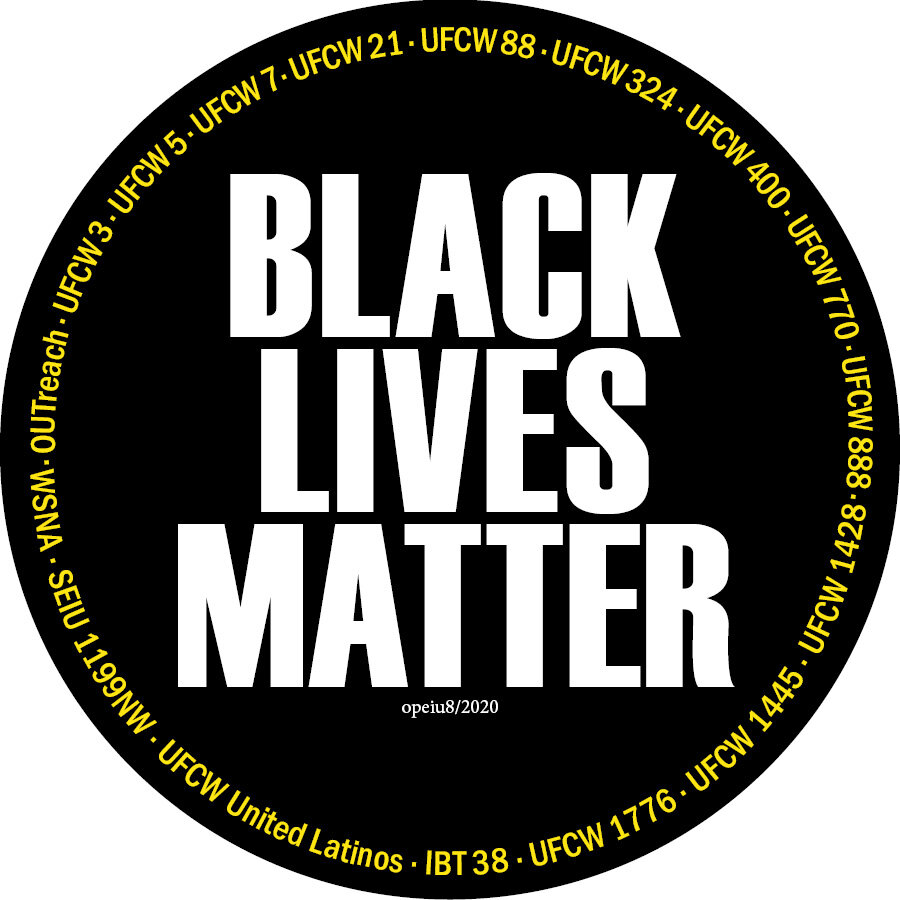
Seattle, WA -- Region 19 of the National Labor Relations Board has informed UFCW 21 of its finding that Fred Meyer and QFC – both Kroger companies – violated federal labor law when it prohibited workers from wearing union-sponsored Black Lives Matter buttons.
Specifically, Region 19 found merit in UFCW 21’s charges that Kroger violated the law by: 1) failing to bargain with the Union over a change in workplace conditions – in this case the practice of allowing the wearing of buttons at work; and 2) prohibiting workers from taking action together – in this case, by wearing Black Lives Matter messages – to protest racism in the workplace and in society, generally.
Region 19 will now seek a settlement agreement with Kroger, which would likely require a change to company policy. If a settlement cannot be reached, Region 19 would typically issue a formal complaint and a trial would be held before an Administrative Law Judge, whose ruling would be subject to an appeal to the NLRB in Washington D.C.
“This is very uplifting. When workers were trying to speak out through these buttons and collectively say Black Lives Matter and Kroger said to take the buttons off, that was an insult. This decision is welcome news in our work to bring attention to social and racial injustice in the workplace and in our neighborhoods”, said Sam Dancy a Front End Supervisor at the Westwood Village QFC in West Seattle, WA.
Motoko Kusanagi, a Front End Checker at the University Village QFC in Seattle reacted, “We wore the pins because it seemed like the right thing to do. My coworkers showed me their pins happily, letting me know they stood in solidarity with me and my family. One of the core values of the store is inclusion, so we did not think “Black Lives Matter” was a radical statement for this business. The amount of pushback we received for such a small showing of support still sits wrong with me to this day. I’m glad we could fight back.”
UFCW 21 President Faye Guenther concluded, “In the wake of this welcome action by the NLRB, we are calling on Kroger to respect workers’ rights and take meaningful steps to address racial inequities in Kroger workplaces. Among other things, Kroger needs to do a better job of hiring and promoting African Americans at every level of the company and making it clear that it will not tolerate racism from customers or employees.”
After Minneapolis police officer Derek Chauvin murdered George Floyd on May 25, 2020, many UFCW 21 members working in grocery and retail stores chose to express their opposition to racism by wearing face masks (otherwise worn for protection from COVID) or other items bearing the Black Lives Matter slogan.
Although Kroger issued public statements expressing sympathy with the Black Lives Matter movement, managers at Kroger-owned stores in Western Washington started ordering UFCW 21 members to remove Black Lives Matter masks in June 2020.
UFCW 21 responded to the company’s Black Lives Matter ban by collaborating with Fred Meyer and QFC workers to distribute union-sponsored Black Lives Matter buttons with the UFCW 21 logo. When managers banned the Union buttons, UFCW 21 filed charges with the National Labor Relations Board. Kroger’s ban and the Union response received widespread local and national attention.
# - # - #
UFCW 21 represents over 46,000 workers at grocery stores, retail, health care and other industry jobs.
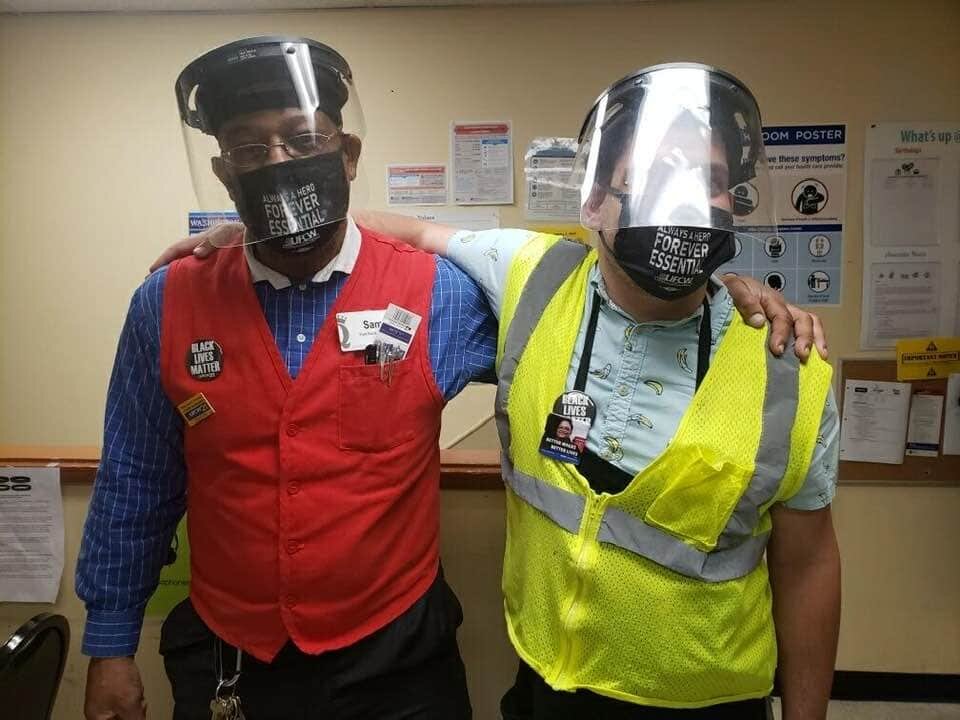
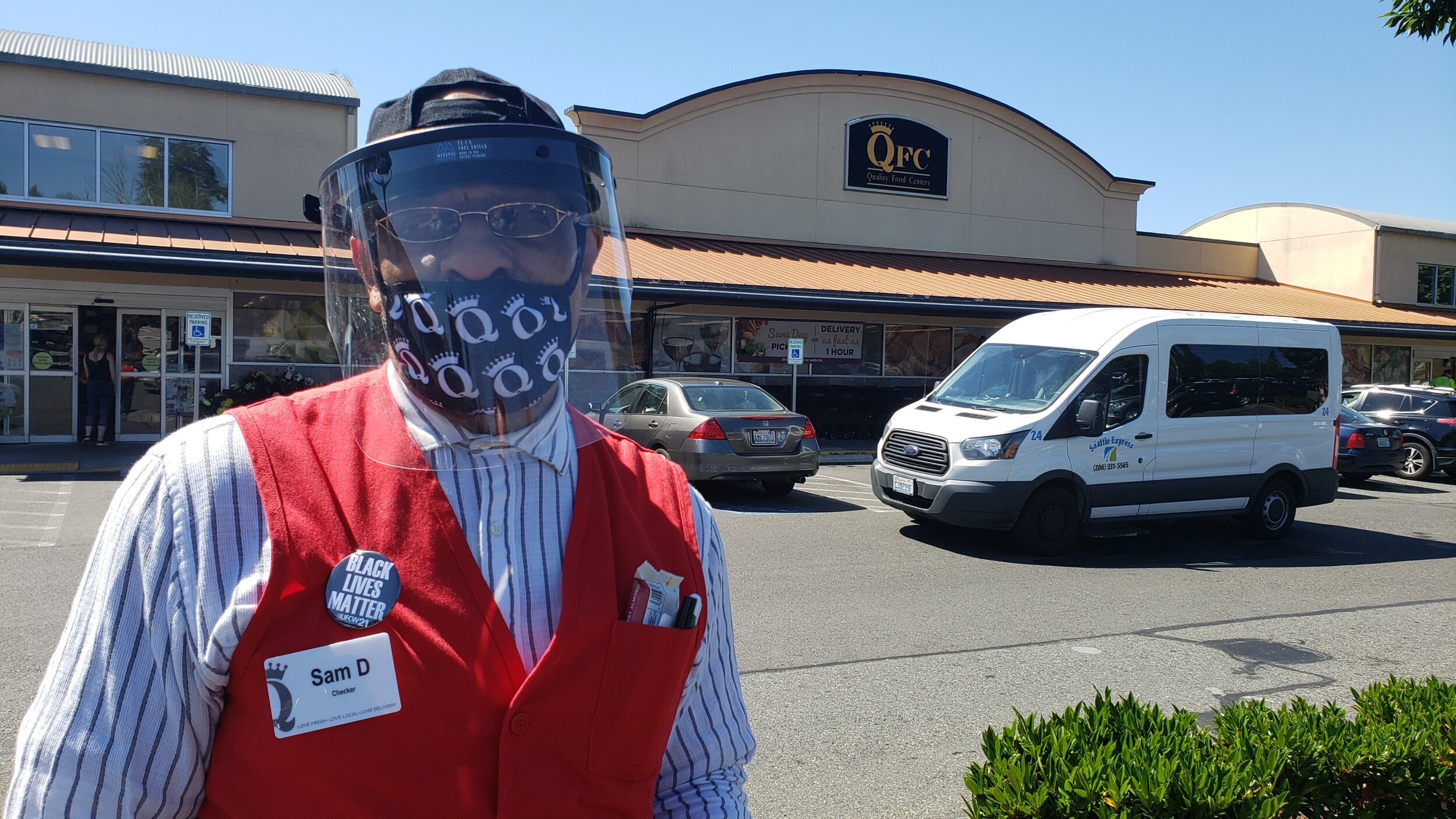
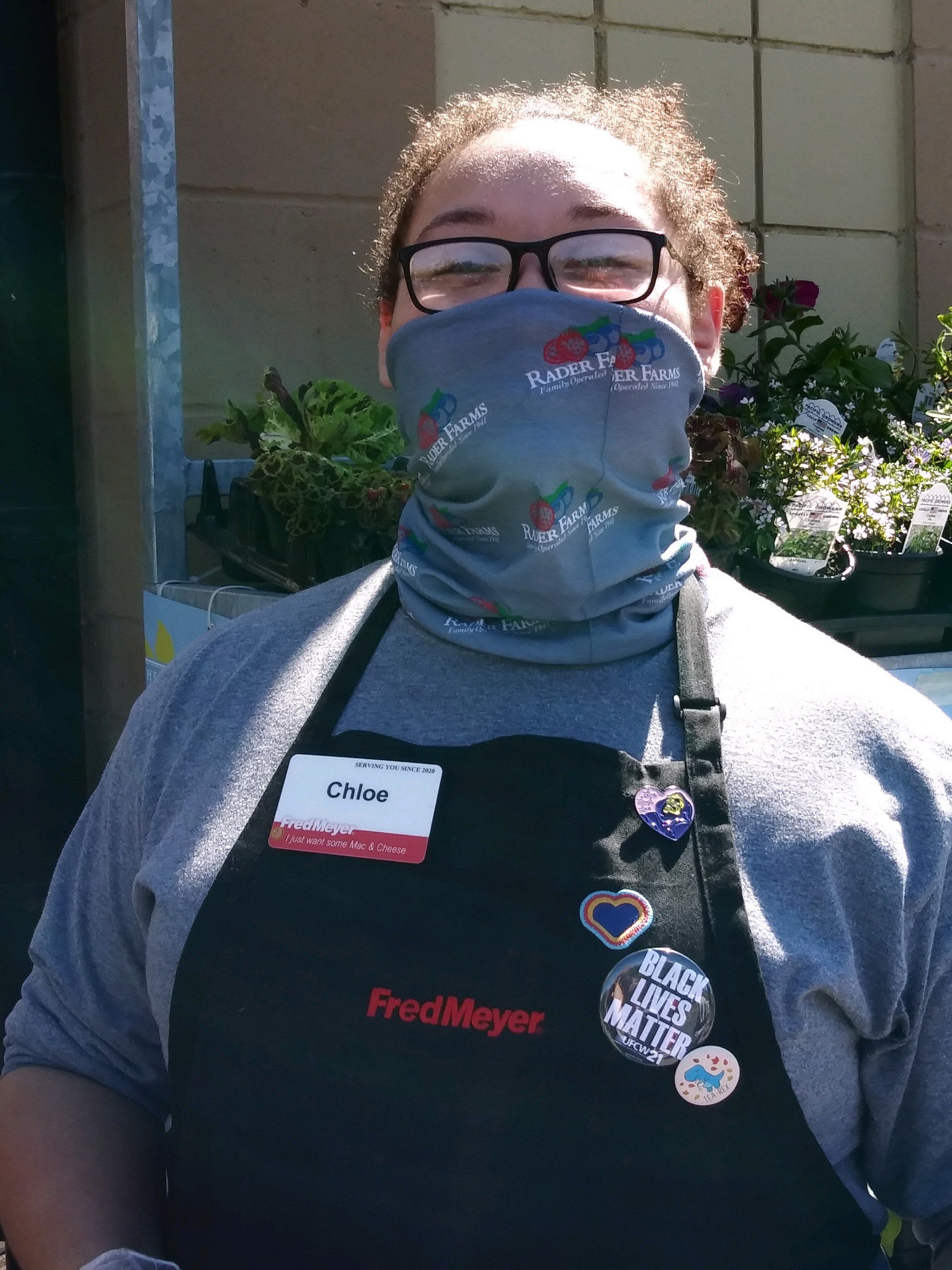
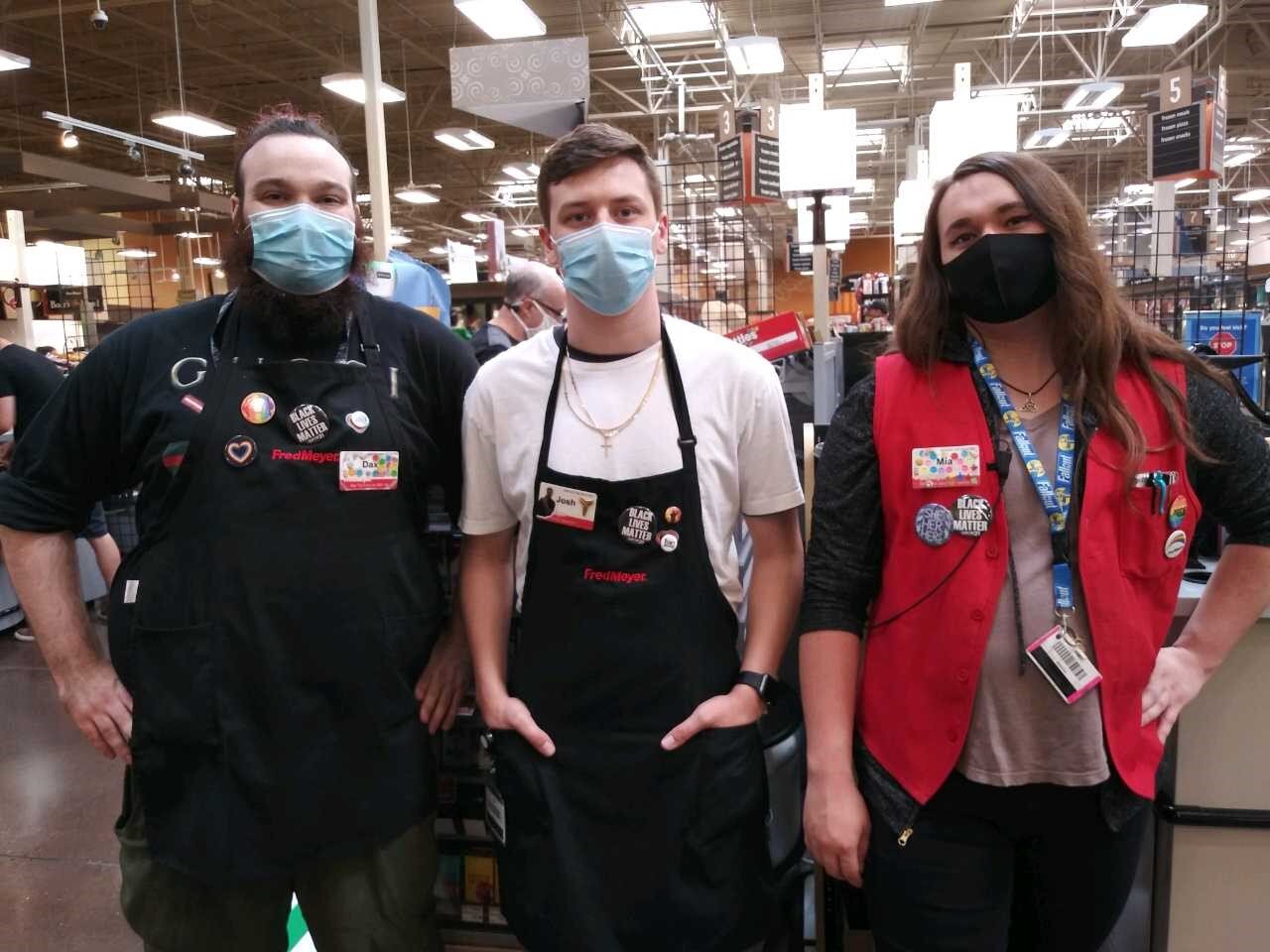
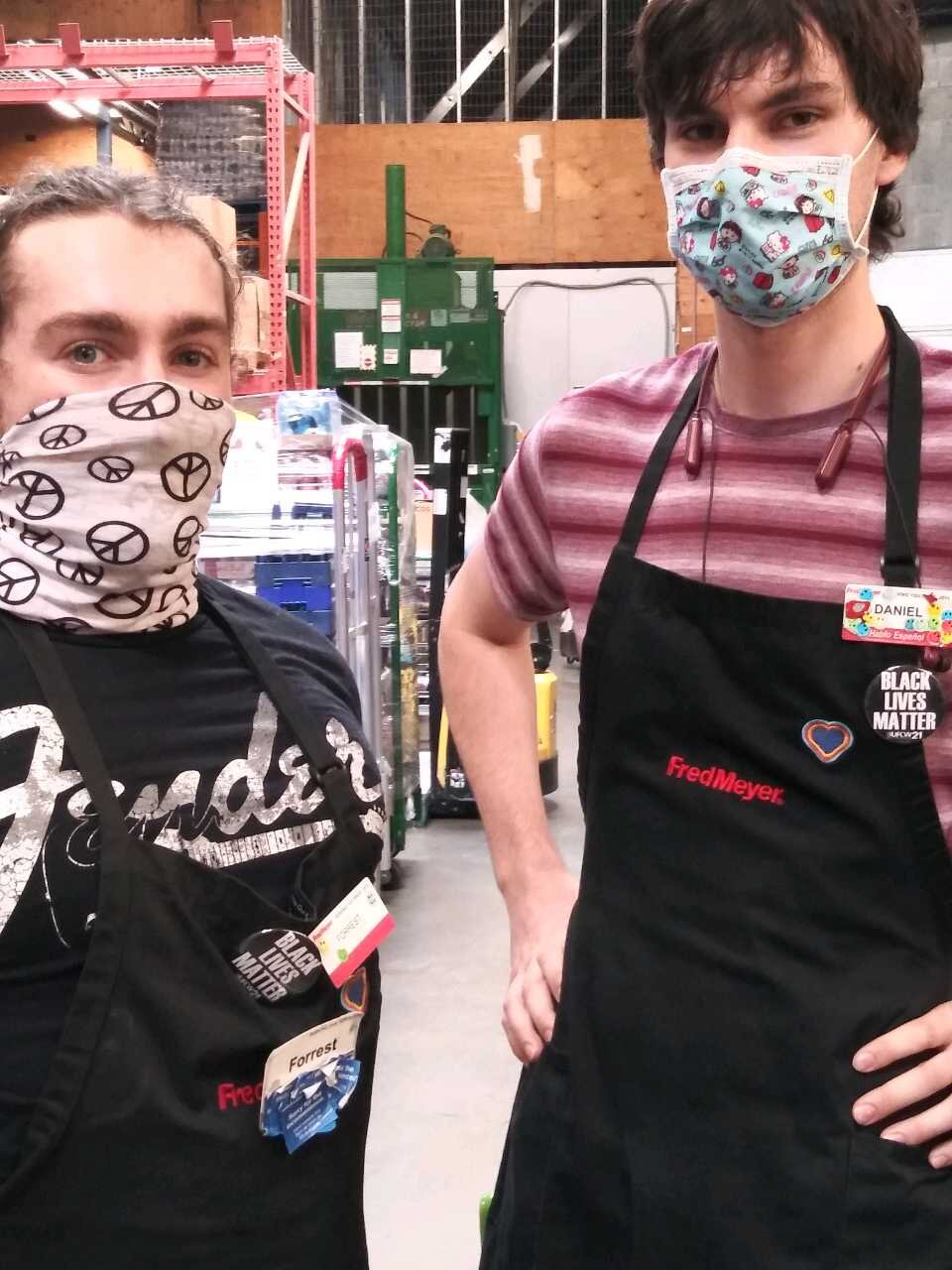
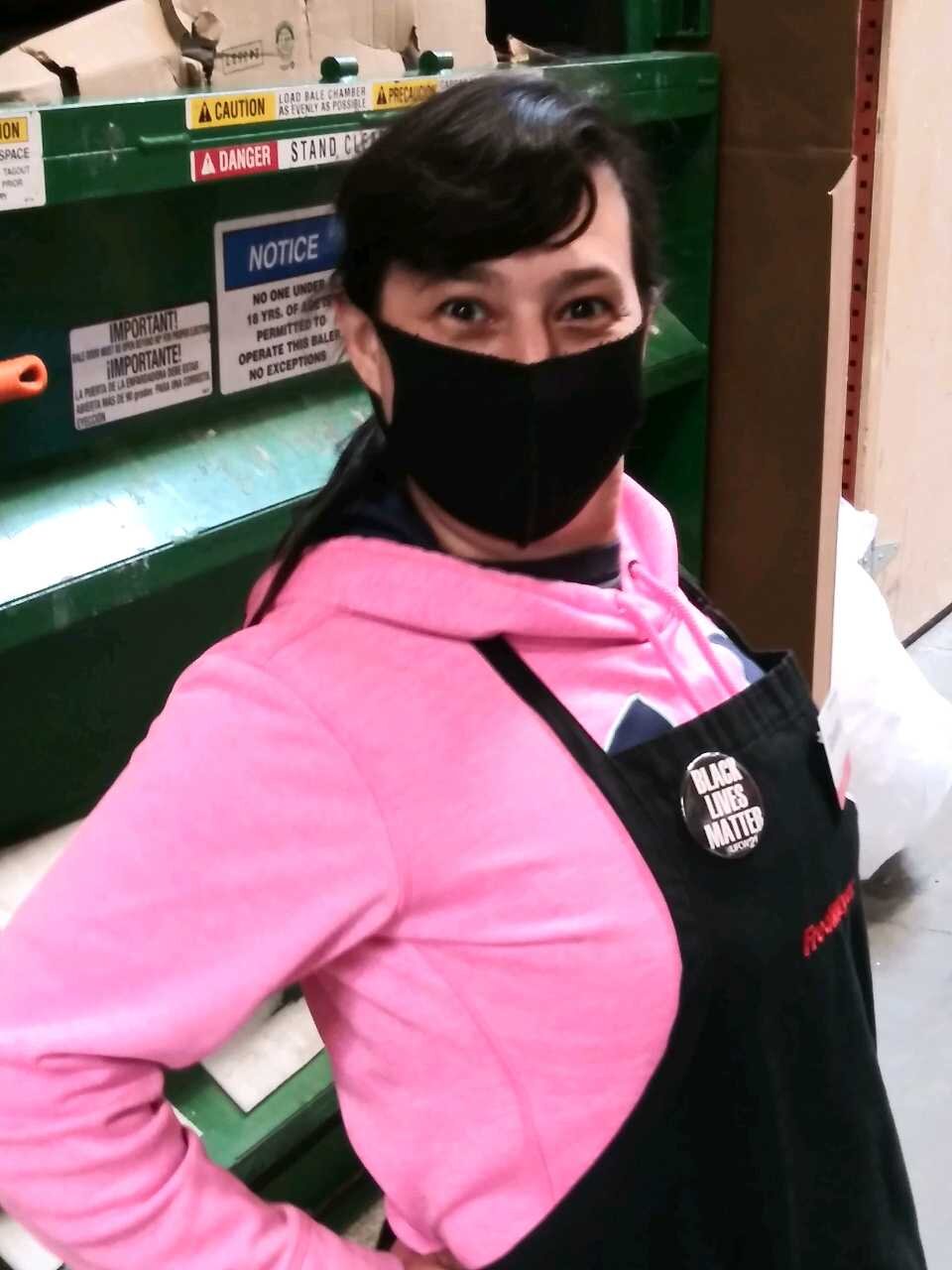
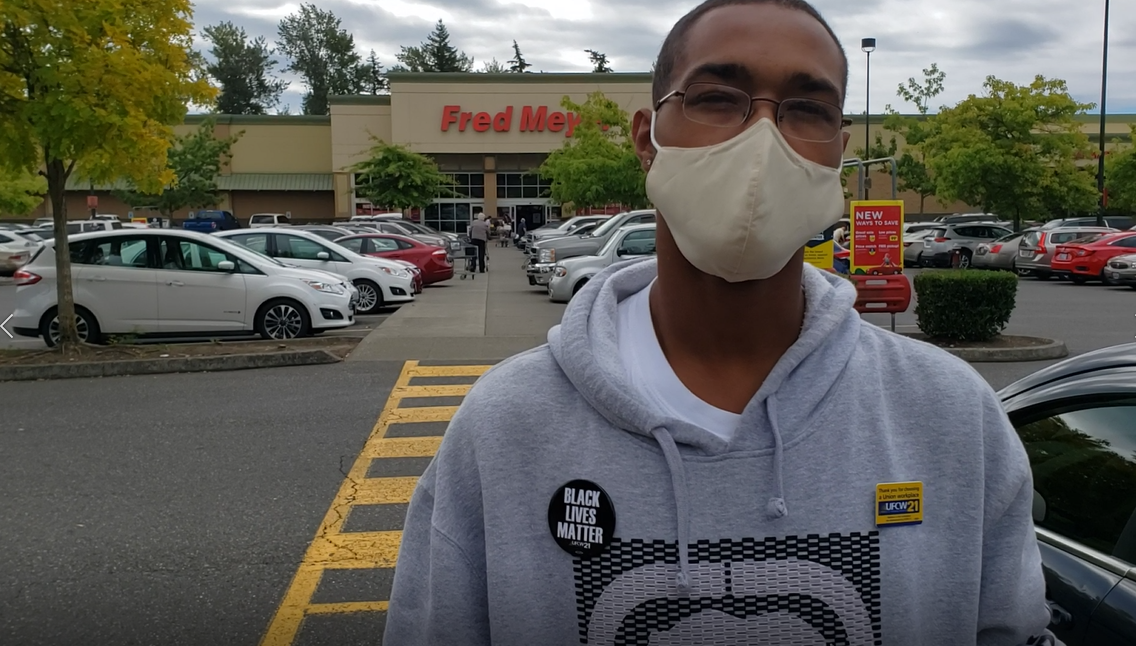
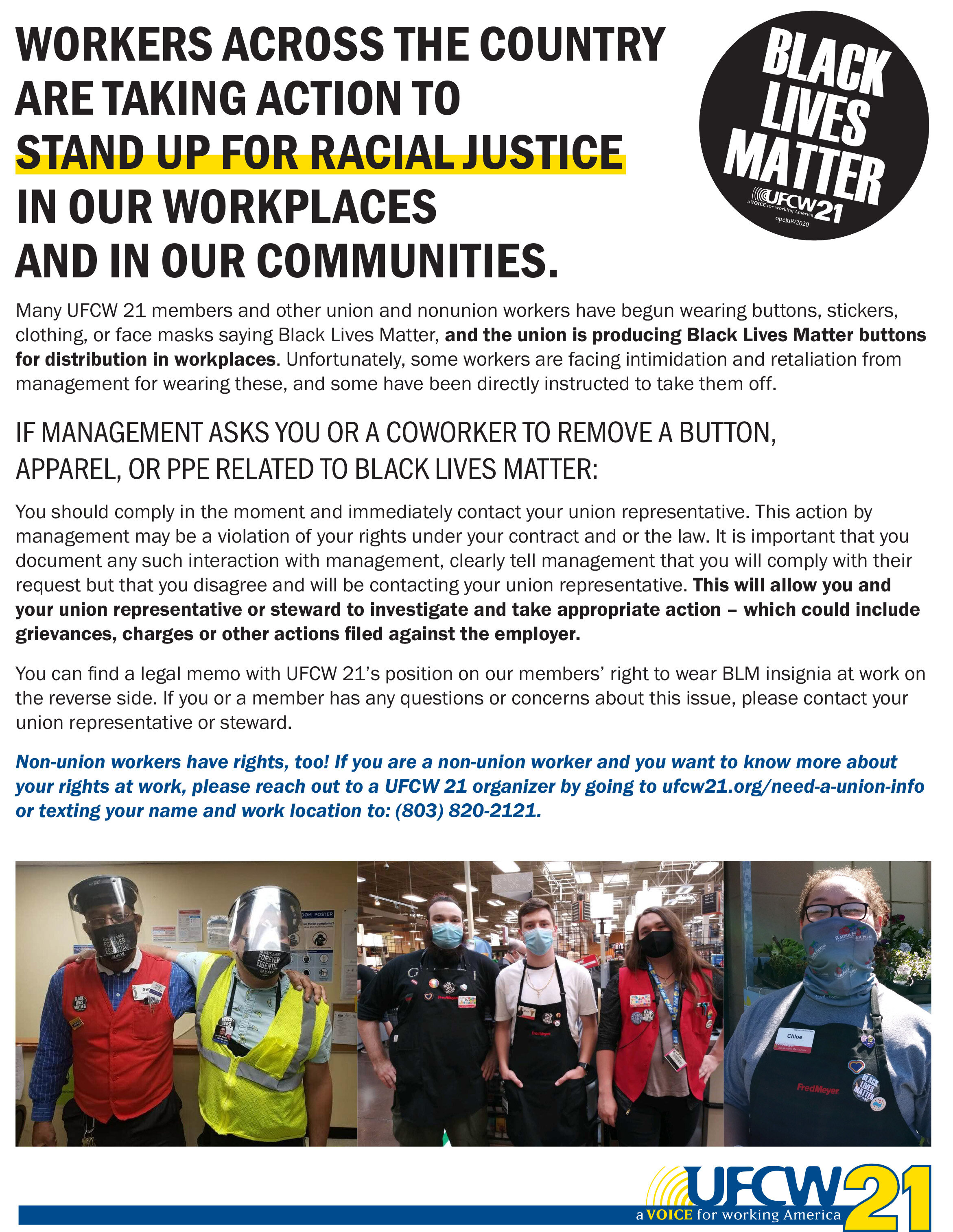
The Department of Health has issued a document with more information and Frequently Asked Questions about the state proclamation requiring health care workers and public employees to be vaccinated against COVID-19. We maintain our right to bargain over the impacts of this proclamation on health care workers and we continue to support vaccination as a key tool in fighting the spread of COVID-19 which is once again stressing our health care system to the limit. If you have any questions about how this proclamation affects you that aren’t answered by these documents, contact your Shop Steward or Union Rep.
Find the full FAQ document from the Washington State Department of Health here.
What documentation do I need to provide to prove my vaccination status?
If you work in a health care setting, you must provide proof of full vaccination against COVID-19 to the operator of that health care setting. Acceptable proof includes one of the following:
CDC COVID-19 Vaccination Record Card or photo of the card
Documentation of vaccination from a health care provider or electronic health record
State Immunization Information System record
WA State Certificate of COVID-19 Vaccination from MyIRmobile.com
Can I attest to being vaccinated in lieu of showing proof?
No. Personal attestation is not an acceptable form of verification of COVID-19 vaccination.
Is there any way to opt out of vaccination?
If you are entitled under applicable law to a disability-related reasonable accommodation or sincerely held religious belief accommodation, then you are exempt from the proclamation. If you are not entitled to an accommodation, then there is no way for a Health Care Provider to opt out of the vaccination requirement in the proclamation.
What happens if I can’t get the vaccine because I was infected with COVID-19 just prior to starting work?
If you are unable to comply with the requirement to be fully vaccinated by October 18 because (a) you were infected with COVID-19 in the weeks immediately preceding the deadline or (b) you had an adverse reaction to the first dose of the vaccine, talk the operator of the health care setting where you are working about their reasonable accommodation process.
Do private employers have to bargain with their unions since this is a government requirement?
Affected employers with workers represented by a union are to address the impacts of this proclamation in accordance with the provisions of any collective bargaining agreement between the parties.
We are the Union. The members of UFCW 3000 are over 50,000 members working in grocery, retail, health care, meat packing, cannabis, & other industries across Washington state, north-east Oregon, and northern Idaho. UFCW 3000 is a chartered member of UFCW International with over 1.4 million workers in North America.
To build a powerful Union that fights for economic, political and social justice in our workplaces and in our communities.